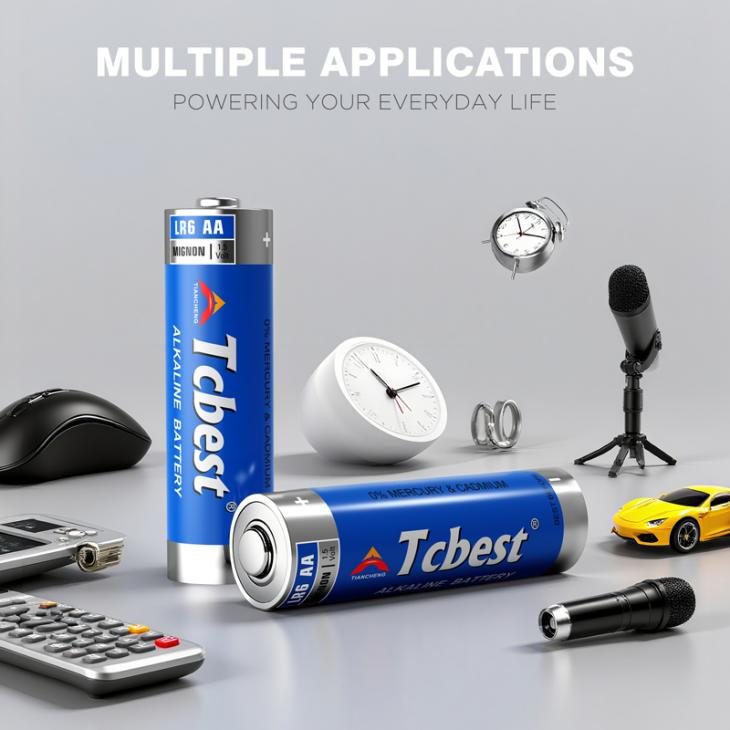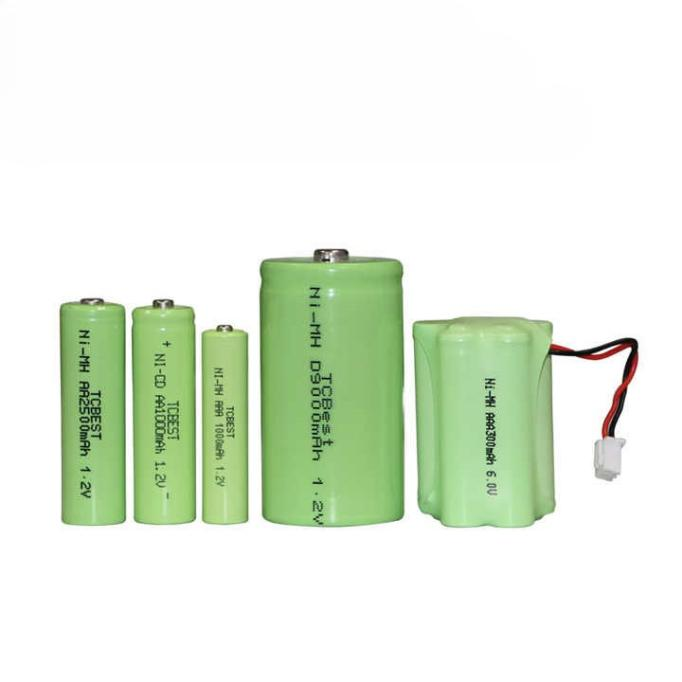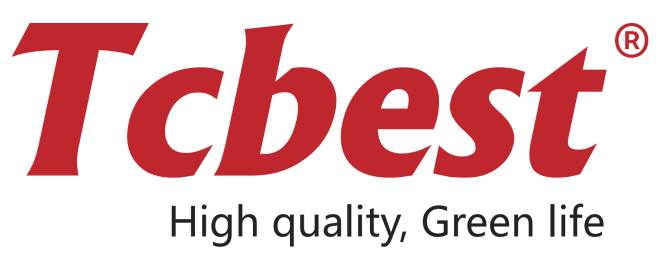Want to know what's really different between alkaline and NiMH batteries --- and how to choose the right one?
In short, it depends on your device's power needs, how often you use it, your long-term cost considerations, and how much you care about environmental impact. Let's break down their core differences and see when each one makes sense.
1. What Is an Alkaline Battery?
An alkaline battery is a non-rechargeable cell with a nominal voltage of about 1.5V, based on zinc--manganese dioxide chemistry.
It's perfect for low to moderate power devices, such as remote controls, flashlights, wall clocks, and many everyday electronics. These batteries deliver stable energy right out of the box --- no charging required.
One big plus is their long shelf life --- even if they sit unused for months or years, they retain much of their charge, making them ideal for emergency use.
However, the downside is clear: they're disposable. If your device needs frequent battery changes, the cost adds up, and the environmental impact increases due to waste. Still, since alkaline batteries are cheap and widely available, they remain a go-to choice for casual or backup use.

2. What Is a NiMH Battery?
Nickel-metal hydride (NiMH) batteries are the opposite: rechargeable cells with a nominal voltage of about 1.2V.
Their strengths are impressive --- good energy capacity, strong high-drain performance, and hundreds (sometimes thousands) of charge cycles. They power digital cameras, power tools, wireless game controllers, and other high-drain devices far more efficiently than alkalines, maintaining steady current output even under load.
For frequent battery users, NiMH cells are more cost-effective over time --- though you'll need to buy a charger and the batteries initially, they pay off after repeated use. They also help the environment by reducing battery waste.
That said, they're not flawless: they tend to self-discharge over time when stored (though low self-discharge models like Eneloop have improved this greatly). They also require proper charging and maintenance --- use a smart charger and recharge regularly to extend their lifespan.

3. Key Differences Between Alkaline and NiMH Batteries
Let's look at the main distinctions in practical terms --- no chart needed:
Voltage:
Alkaline cells output about 1.5V, which may better suit devices sensitive to voltage changes. NiMH batteries provide about 1.2V, and some devices might show a "low battery" warning earlier when using them.
Capacity & Durability:
Alkaline batteries have high single-use capacity but lose performance under heavy loads and can't be reused. NiMH cells offer higher usable capacity in high-drain devices and can be recharged many times.
Long-Term Cost:
Alkalines are cheap per unit (a few dollars a pack), but frequent replacements add up. NiMH batteries have higher upfront costs (batteries + charger), but save money over time with frequent use.
Shelf Life:
Alkalines store energy extremely well --- great for emergency kits. NiMH batteries self-discharge when idle, so low self-discharge variants are better for long-term storage.
Environmental Impact:
Frequent disposal of alkalines increases waste, even with recycling programs. NiMH batteries reduce waste by being reusable, provided they're properly recycled after their lifespan.
Performance in Extreme Temperatures:
Both degrade under extreme cold or heat, but alkalines lose more capacity in freezing temperatures. NiMH batteries maintain more stable output under high-drain conditions.
Weight:
Alkalines are lighter than old zinc-carbon cells but heavier than lithiums. NiMH cells are slightly heavier, though they often deliver more usable energy under load --- something to consider for balance-sensitive gear like small cameras.
4. Pros and Cons --- Real-World Use
Alkaline Batteries: Convenient but Limited
Pros:
Easy to find: Available everywhere; no charger needed.
Long shelf life: Great for emergency kits or seldom-used devices.
Reliable for low-drain devices: Perfect for remotes, clocks, etc.
Cons:
Not rechargeable: Expensive and wasteful if replaced often.
Poor in high-drain devices: Drains quickly in power-hungry gear.
Voltage drop: Declines steadily during use, which can confuse voltage-sensitive electronics.
NiMH Batteries: Economical and Durable but Needs Care
Pros:
Rechargeable: Can be reused hundreds or thousands of times --- saves money and reduces waste.
Performs well under load: Ideal for high-drain devices like power tools and digital cameras.
Eco-friendly: Less waste; easy to recycle.
Cons:
Higher upfront cost: Batteries and charger required initially.
Self-discharge: Loses charge over time if unused (low-self-discharge types fix this).
Maintenance needed: Must use a proper smart charger and avoid overcharging or deep discharging to maintain lifespan.

5. When Should You Choose Alkaline Batteries?
Pick alkaline batteries when:
Your device uses little power or runs infrequently (like remotes, clocks, emergency flashlights, or seasonal decorations).
You need long shelf life or don't have access to charging (e.g., camping, car emergency kits).
In short: if your device doesn't drain batteries quickly, alkalines are simple, reliable, and cost-effective. But for high-drain devices, NiMH will perform better and last longer.
6. When Should You Choose NiMH Batteries?
Choose NiMH when:
Your device uses lots of power or runs daily, like digital cameras, power tools, or toys.
You want to save money and reduce waste over time --- after several months, they pay for themselves.
Keep in mind:
Get a compatible charger and develop a regular charging habit (e.g., recharge overnight).
If storing batteries for long periods, choose low self-discharge NiMH models so they're ready to use later.

7. Final Takeaway: How to Choose Wisely
Choosing between alkaline and NiMH batteries doesn't have to be complicated --- it's all about how you use your devices.
For low-drain, seldom-used, or emergency devices → go with alkaline batteries: convenient, maintenance-free, and always ready.
For high-drain or frequently used devices → choose NiMH rechargeables: eco-friendly, economical, and long-lasting once you've made the initial investment.




